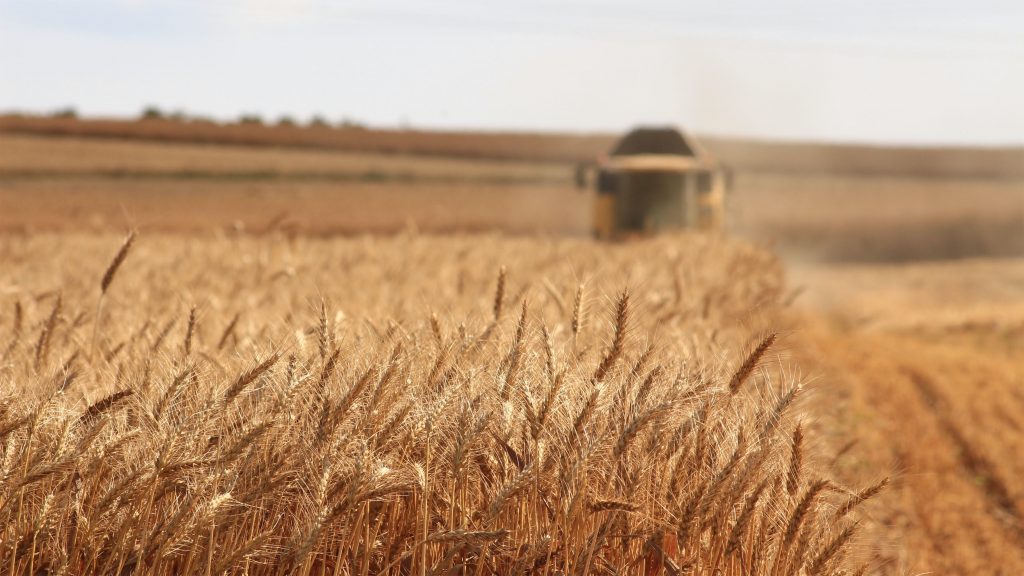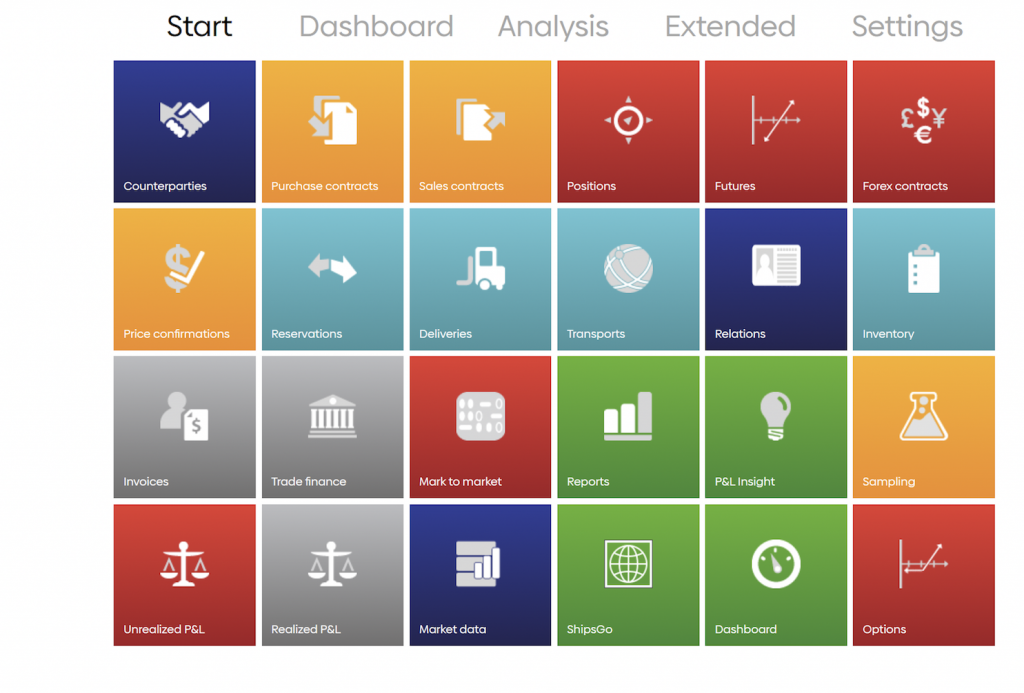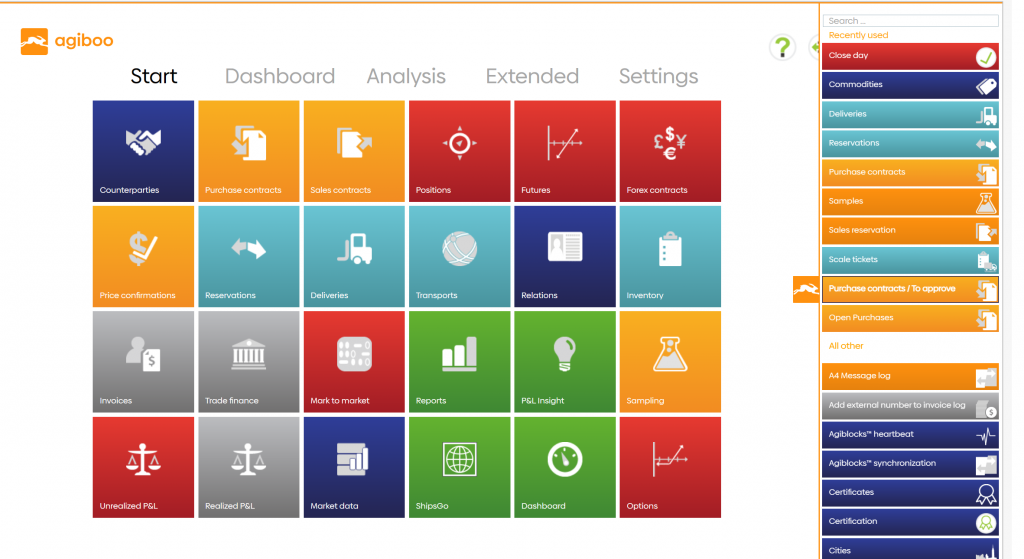Agiboo is a provider of commodity trade and risk management solutions with a focus on agricultural and soft commodities, specifically Cocoa, Coffee, Sugar, Cotton and Grains. The flagship product Agiblocks, now in its powerful 4.0 version, has been adopted in the commodity trade and risk management industry since 2011 for these specific commodities and many more – including biofuels – and has since been continuously improved to incorporate the many years of progress that reflect all the intricacies of your industry.
Agiblocks CTRM is our flagship software solution. It supports trading management as well as financial management from the same source of data and within the same easily accessible application. Its modular structure allows you to implement an end-to-end solution or to select individual functions to implement only the functions you need, with a myriad of additional features at your fingertips – including the option to integrate external content.
The specialization of our software is what makes it the foremost CTRM solution for agricultural commodities in general, and for the biggest soft commodities specifically. If that comes as a surprise to you, we’d like to take this opportunity – the international spotlight of Geneva’s Global Grain – to explain how Agiblocks caters to grains with unrivalled dedication.

Agiboo & Global Grain
Global Grain Geneva hosts key voices from across the global supply chain, to provide you with the information required to negotiate the best deals for the year ahead. Dig into and debate contentious issues, gain insights to ensure you are able to get ahead of and manage upcoming risks, between your meetings with partners from around the world.
Grain – and indeed the Global Grain convention – is right in our sweet spot. It is what we do, and what we do well. In fact, grain is one of four Specialized Commodities – the other three being cocoa, sugar and coffee. Grain trading has a number of very specific aspects to it that not every CTRM solution will be able to handle with ease, or even at all.
Agiboo has made it its mission to handle all of them – with Agiblocks.

Agiblocks & Grains – and the specific complexities of the commodity
As grain is a collective term that is used for anything from wheat to barley and rice, it is essential to work in a CTRM system that supports all the various specifics. It needs to be able to handle the general complexities of any particular commodity, for sure, along with providing features such as usability, performance and integration.
We’d love to talk you through some of these specific complexities.
Divisibility
First and foremost: grain is an umbrella term for everything from wheat to corn, barley and even rice, as previously discussed. In addition, oilseeds are often raked into the mix too. That divisibility makes it a very complex commodity. That means we’re obviously dealing with multiple market prices for all these variations, but more than that there’s a multitude of differentiating factors within one overall commodity that needs to be addressed, ranging from quality factors in wheat and the various uses for corn to all available varieties of rice, for instance. All of that needs to be covered in the software you use to collect and trade all of your contracts. All of it is, of course – in Agiblocks.

Exchanges: lots of exchanges
Grain Futures are heavily traded on exchange across the globe. Wheat Futures contracts are being traded on three exchanges in the United States: Chicago Board of Trade (CBOT), Kansas City Board of Trade (KCBT) and Minneapolis Grain Exchange (MGEX). The main exchange for wheat futures contracts is the CBOT. Corn Futures are also traded on the Chicago Board of Trade (CBOT). Barley Futures are being traded on the Inter Continental Exchange (ICE) Canada. Similar to wheat and corn futures contracts, the Chicago Board of Trade (CBOT) is the main exchange for trading rough rice futures.
To get to the point: not only are there many markets and exchanges, but there’s also a strong influence of regions on the pricing. For example, Black Sea Grains (/Wheats), grains that grow around the Black Sea, are substantially different from the products of Canada. There is not only a variety of different types of grain within the overall commodity, the various ‘sub commodities’ also have very different properties, all affecting the market price.
Furthermore, different regions have different ways of trading. In Canada, one might do business with a huge GMO farm that supplies all your corn needs, whereas rural areas in Mexico and France are made up of a lot of small farmers, many of which might not even have the capacity for essential elements of trading such as a proper financial administration.
Which is to say, when you source your product from these local producers, you might have to sit down and create all of the appropriate invoices.
On the other hand, you could have Agiblocks do that for you. Wherever, whenever.
Differentials and derivatives
Another factor that plays into pricing for grain is the effect quality has, on a level that cannot be compared to cocoa or sugar. That’s because the quality of grain is assessed on the basis of a lot more parameters than those other commodities. Uniform moisture contents, high test weight, absence of foreign material, low percentage of discolored, broken and damaged kernels, low breakability, high milling quality – et cetera, et cetera. All the variables have to be accounted for in your software solution when trading grains.
Furthermore, location is a huge part of pricing as well. A ton of wheat could go for 200 dollars, whereas a ton of cocoa might set you back 2000 pounds – making freight a much more important component for grains. Cocoa is, in general, produced to be exported, so it’s all send to ports for shipping. Distribution of grains is much more, pardon the pun, fine-grained: more local cultivation, more local storage, much more local processing. Agiblocks is suited like no other CTRM solution to handle that challenge of complexity.
Logistics
Grain is stored in huge silos that can hold up to 100 tons of product. However, due to the local nature of grains both in terms of production and processing, the contents of a particular silo, no matter the quantity, are usually not sourced from one seller, nor are they intended for one single buyer. That means any silo holds up to N quantities of grain, where company A is responsible for 2 tons, company B holds 5 tons, and so on.
A full silo of corn therefore may look like a rather straightforward deal in terms of trade and traffic (Company A has 100 tons of corn, Company B would like to buy 100 tons of corn), but in reality, it is a complicated mix of stakeholders. Our CTRM software has all the necessary tools to reflect that reality – including Weighbridge Integration to increase efficiency and manage the potentially multi-location architecture of the deal.
Another logistics related issue that sets grains apart from sugar, cocoa and coffee is the fact that grain is very often transported by train. Canada and the countries surrounding the Black Sea, for instance – two important regions for grain – have an entire logistics chain set up in which trains are used in combination with railroad silos. Bulk shipments are also substantially different, as cocoa for instance is placed in big bags used to fill containers, whereas grain can fill an entire Panamax ship.
These deviating dimensions with respect to commodity logistics are reflected in Agiblocks.

The GMO Factor
The last variable we’d like to discuss here is the ‘GMO factor’. In the coffee and cocoa trade, for instance, quality-control and to a more important degree sustainability of production is reflected in UTZ certifications. In the production of grain, or soy beans, there is an increasing amount of GMO technologies. A GMO, or genetically modified organism, is a plant, animal, microorganism or other organism whose genetic makeup has been modified in a laboratory using genetic engineering or transgenic technology.
On a practical level, the GMO factor in grains is something that sets it apart from most other commodities, so it does need to be addressed. For instance, agricultural commodities produced in North America by means of GMO technologies can’t be imported into EU countries just as easily as product from the Black Sea-region can. In other words, this creates another distinctive factor that sets commodities apart from one another.
Note that these are just a few of the specific issues around grain trading that are often either not supported in a generic CTRM solution, or may require some form of work-around to handle. And those work-arounds don’t come easily. Because some of these aforementioned factors may seem like small areas of functionality, to add them to an existing CTRM is a major undertaking as that the functionality needs to work across the system. For example, in position management reporting, for hedging purposes where traders need to hedge small quantities of commodities individually; both currencies and terminal markets, where it impacts pricing, price formulae and so on. Adding a small area of specificity for a commodity has huge ripple effects across the entire solution that also need to be considered.
Anyone looking to procure CTRM software for grain trading should ensure that the short-listed solutions are able to handle such specifics along with all of the other expected functions of a good and usable product. Preferably one that adapts to the future, too.
Agiblocks: your go-to grains solution
Agiblocks is a multi-commodity capable system out of the box. Built on modern technology, it provides functionality for trading physical commodities and their terminal market instruments. It supports contract management, logistics fulfillment, forex and hedging, and it has tools for real-time risk analysis and risk management. It supports both trading management and financial management from the same source of data and within the same application. Its modular structure allows users to implement an end–to-end solution or to select individual functions to implement only the functions that are needed.
While Agiblocks is a strong contender across many commodities, it is extremely strong in terms of meeting the specific requirements of the grain markets with a number of customers implemented and using the software to support their grains trading businesses.
Not convinced? Find out for yourself! Reach out to us for a demo or a meeting with George Bradshaw, our new senior account manager, who will be attending Global Grain to share insights into the world of commodity management and how Agiblocks provides all of the functionalities discussed above that are specific to grain.


